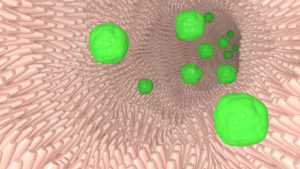Alternative Treatment for Crohns Disease
Crohns disease, an autoimmune disorder, is characterized by chronic inflammation of the intestines. Named after the physician who described the disease in a landmark paper written in 1932, the disease primarily causes ulcerations in the small and large intestines, but can affect the digestive system anywhere between the mouth and the anus. The condition affects men and women equally and seems to run in some families. About 20 percent of people with the disease have a blood relative with some form of inflammatory bowel disease, most often a brother or sister and sometimes a parent or child.
How Does Crohns Disease Develop?
 In Crohn’s disease, the body’s immune system responds abnormally to its bowel contents. The gastrointestinal tract is composed of cells and proteins that normally protect the body from infections or other foreign invaders. A normal immune system would not over respond to food, bacteria, and other substances in the intestines. In patients with Crohn’s disease, the immune system overreacts actively to a variety of substances and/or bacteria in the intestines, causing inflammation, pain, bowel injury, and ulcerations.
In Crohn’s disease, the body’s immune system responds abnormally to its bowel contents. The gastrointestinal tract is composed of cells and proteins that normally protect the body from infections or other foreign invaders. A normal immune system would not over respond to food, bacteria, and other substances in the intestines. In patients with Crohn’s disease, the immune system overreacts actively to a variety of substances and/or bacteria in the intestines, causing inflammation, pain, bowel injury, and ulcerations.
Disorders Associated with Crohn's
Osteoporosis & arthropathy in ankles, knees, hips, wrists, elbows, and shoulders often begins prior to the development of gastro symptoms.
Skin Ulcers and Red Bumps often appear and are painful. Biopsies are rarely needed to be diagnosed as a co-morbidity with Crohns disease.
What are the Symptoms of Crohns Disease?
The symptoms of the disease vary. The disorder usually recurs at intervals throughout life, with severe episodes lasting weeks or months before settling down to periods with mild or no symptoms. The crohn’s disease diagnosis includes symptoms of diarrhea that often contains blood, a bloody discharge from the anus, abdominal pain, fever, weight loss, and a general feeling of malaise.
References on Crohns Disease
For answers and to make an appointment, call toll-free 800-923-7878 to speak with our Patient Care Team.
Recover your vitality, reclaim your energy and rediscover your health.


